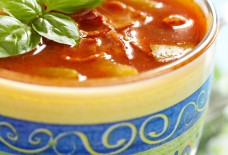The Lebanese National Tabbouleh Day
By Ricardo Mbarkho
The Lebanese National Tabbouleh Day is observed on the first Saturday of July as an annual festival dedicated to Tabbouleh, a traditional Lebanese dish. On this day, Lebanese, non-Lebanese, and their friends across the world gather in private or in public around this dish. With Tabbouleh being the common ground for all Lebanese people, this gathering event reminds all participants of the beauty and happiness in life rather than war and hatred. The National Tabbouleh Day is an artistic, cultural, and gastronomic feast that brings people (including tourists) together and aims to bring peace to both Lebanon and the world.
To many Lebanese people, Tabbouleh is not just one of many traditional dishes. Tabbouleh has a uniting influence over the war-torn country, because it materializes their common cultural background. The diverse ingredients of Tabbouleh also symbolizes the complex ethnic distribution of Lebanon; just as peace will not last without the coexistence of different ethnic groups, the absence of one ingredient breaks the delicate harmony of the Tabbouleh’s unique mouth flavor.
As a Lebanese visual artist, I dreamed of creating an arena for all Lebanese people to celebrate their shared identity. Tabbouleh, one of the most popular and beloved traditional dishes in Lebanon, served as an excellent medium to reaffirm the common heritage. In April 2001, I suggested creating the National Tabbouleh Day to my friend Allam Sleiman, a Lebanese computer programmer.
We soon drafted the first communiqué, which declared every first Saturday of the month of July to be the National Tabbouleh Day. We notified about 20,000 Lebanese about this new festival and invited them to deliver the message across the world. As the news spread to all corners of the country, hitting domestic and international media circuits, the Lebanese Ministry of Tourism officially endorsed the festival in 2007. Since then, the National Tabbouleh Day has been widely celebrated both home and abroad; from 2006, the Biennial de Paris presented the editions of the National Tabbouleh Day as one of its selected artworks.
With various parts of the world still suffering from incessant wars, celebrating the National Tabbouleh Day reminds people of the value of life and strengthens their commitment to peace. By creating this national holiday, I wanted to raise awareness of the importance of life, and gather all the Lebanese people around a traditional dish to both demonstrate and strengthen our attachment to life.
We encourage all the Lebanese and friends to consider the first day of July a celebration day, to honor our survival, which became a valuable quality through many years of struggling. Keep in mind that the purpose of this event is to raise awareness around the value of life as is, regardless of our origins, family, personal, or social conditions.
According to Alexandre Gurita, Director of Biennale de Paris, the National Tabbouleh Day is an artistic project fully integrated to the social context of Lebanon, which vacillates between war and peace. This project uses social and geopolitical spaces as an artistic medium and not necessarily declares itself as an art.
In this sense, the Lebanese National Tabbouleh Day is representative of the “invisual” art, a practically formless artform that transcends the power of any single artwork. Moreover, the celebrators of this day are not mere spectators of an artwork. They can be considered as the “indifference public”: people who, intentionally or by chance, interfere with proposals that may not necessarily be identified as artistic. This new audience lacks the predispositions that come with the usual visual art-based audience who usually made aware in advance of what is going to be seen in the art field they are interacting with.
The Lebanese are enjoying this festival by fashioning their own special Tabbouleh recipes. Some cook Tabboulehs into different flavors to suit the tastes of their beloved ones. Others openly experiment and enjoy people’s feedback on their creations. Those who cook Tabbouleh may also decide to pay extra attention to tiny details, such as the ingredients they use. They select the vegetables very carefully, using only those from their own gardens raised with care and love. They believe that inventing different ways of making Tabbouleh will not only make it more delicious and healthy but will also enrich the diversity of Tabbouleh by bolstering a creative competition worldwide.
By observing the Tabbouleh Day, Lebanese people are becoming more aware of the importance of sharing life with others and dreaming together of peace across religious and culture divisions. As much as it promotes life, peace, and harmony, the holiday will also open a new front in understanding creativity and help redefining the relationship between the arts, people, and society.
Source: www.worldpolicy.org



